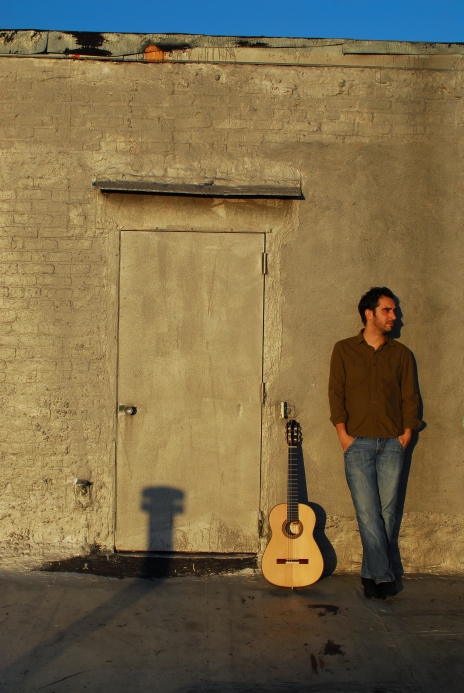Just a couple of months ago we connected with Achilles Kallergis at El Born, a dope Spanish restaurant down the street from us. This multi-faceted Brooklyn-based artist by way of Athens, Greece, and Switzerland utilizes his guitar to reflect on and respond to the various sets of stimuli that comprise the reality we live in. Achilles has recently dove into the art of Flamenco music and he celebrates the power and continuity of this folk art form that has handed down generations of style, melody, and story. Drawing on his global presence, his future projects involve recording albums with connected artists from around the world. In a piece that locates the power of song as a common denominator around the globe, Achilles breaks down the collaborative and improvisational possibilities of music.
Art is very esoteric and personal but it is also an attempt to connect and communicate with people, the need to feel part of the world, of a place, of a community. And that is a contradiction: the secret or mystic world of the artist crying out for contact and connection with the rest of the world.
– Achilles Kallergis
Leading off with some basics, where are you from? And where are you at?
AK: I am from Athens, Greece and currently living in Brooklyn NYC for the past five years. I’m a musician, guitarist, and composer interested in both written and improvised music forms.
What does Reflection and Response mean to you?
AK: Any artistic expression is a response or in response to something experienced. Art reflects life, lived or even un-lived experiences so reflection and response is always at the center of any piece of art.
How does your work fit in with that definition?
AK: Especially in improvised music (whatever the style) I think everything is response and reflection. It can be a response to a musical phrase, to one note or texture (even to the sound of the cash register at the bar). At the same time though it reflects the mood, personality and experiences of the performer. It is responding to and “being at the moment” while reflecting who you are.
What else have you been working on recently? What are you looking to work on next?
AK: Recently I’ve been getting obsessed with flamenco. It’s definitely a new art form for me which I started getting deeper into more recently. Definitely challenging in every aspect but also extremely deep in a unique way. It is really heavy and powerful music. Also, at a time where everything is about the next “new thing” or new sound it is very refreshing to go back to a folk music form, that does not claim to be innovative but strongly rooted in the history of its people. One that has been orally transmitted from generation to generation and that brings with it the tumultuous history of Gitanos, perhaps the most misunderstood and persecuted group in history. I feel this connection to the past is something that is missing from many new music idioms. Maybe flamenco showcases the importance of response and reflection – a response and reflection on the history of Gitanos by Gitanos.
In terms of new works, I’m looking forward to record two albums. The first one will be based entirely on my compositions and will document my working jazz quartet featuring Timo Vollbrecht on saxophone, Adam Hopkins on bass and Nathan Ellman-Bell on drums. I’ve been playing with these guys for a while now and I’m grateful cause they are all amazing musicians who manage to add a new dimensions to my music.
Another exciting future project is a collaboration with some musicians from Switzerland featuring Ganesh Geymeier, great saxophone player and improvisor, Michael Gabriele and Marc Olivier Savoy who are both members of Ouizzz one of my favorite bands (make sure that you check them out!). I will be joining them for a recording in Switzerland next summer and I am really happy to reconnect and play with these guys.
Who or what inspires you?


